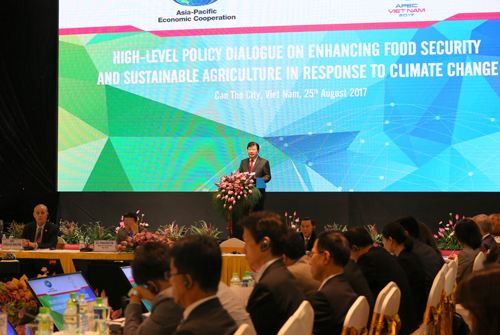VN ready to cooperate in food security
VGP – The Vietnamese Government attaches extreme importance to APEC cooperation and vows to work with other APEC economies to ensure food security in favor of regional peace, stability, sustainable development, and prosperity, said Deputy PM Trinh Dinh Dung.
 |
|
Deputy PM Trinh Dinh Dung at the opening ceremony of the High-level policy dialogue on enhancing food security and sustainable agriculture in response to climate change, Can Tho City, August 25, 2017 - Photo: VGP/Xuan Tuyen |
The Government leader made the point on August 25 in Can Tho City at an opening ceremony of the High-level policy dialogue on enhancing food security and sustainable agriculture in response to climate change.
The High-level policy dialogue is the highlight of the APEC Food Security Week in Can Tho, targeting to implement one of the four top priorities in APEC 2017 on enhancing food security, sustainable agriculture in response to climate change.
The event drew the attendance of APEC ministers, heads of delegation, the APEC Secretariat, and leaders of international organizations.
The Food and Agriculture Organization (FAO) reported in 2017 that APEC economies produced around 1.348 billion tons of food, accounting for 60% of global grain output including 409.5 million tons of rice (82% of global rice output).
However, the Mekong Delta Region in Viet Nam has been recently affected by climate change. Especially, serious droughts and saltwater intrusion have occurred seriously over the last decade, directly threatening lives of 20 million people and indirectly affecting hundreds of million of customers in the world.
In the Asian Pacific Region, climate change and natural disasters have forcefully affected respective economies and damaged general production. Earthquakes and tsunamis in Japan, floods in Thailand, quakes in China, droughts in the U.S. and New Zealand affected food security, the common concern of APEC economies.
Shaking hands for solutions
Addressing the event, Deputy PM Dung hailed APEC for proactively implementing specific action programs to implement the Framework for Multi-Year APEC Program on Food Security and Climate Change and the Rural-Urban Strategy for Food Security in APEC.
According to the Deputy PM, the region is facing challenges on food insecurity, drastic competitions in agricultural production and trade, and serious impacts of climate change. These challenges demand APEC to renovate and improve cooperative efficiency to enhance food security and sustainable agriculture in response to climate change.
Hence, Deputy PM Dung recommended the ministries and Heads of delegations discuss and make policy recommendations to beef up cooperation and support each other to build and develop sustainable green agriculture, aquaculture, in response to climate change, renovate technology in agricultural production to ensure food security and nutrition security.
Mr. Dung said that APEC consists of economies with developing and developed agriculture standards. These economies enjoy favorable conditions to associate and form supply chains. Nevertheless, differences in production standards, resources, and technologies have hindered the general development, requiring member economies to strengthen cooperation and seek optimum solutions towards sustainable green agriculture in response to climate change.
The Deputy PM noticed the importance of further researching and transferring modern technologies in agro-forestry-fishery production to raise output and product quality; accelerating IT application and management; strengthening cooperation in food security, nutrition security; reducing food loss and waste.
He highlighted the necessity to forge favorable conditions for the development of a global food consumption market which relies in multilateral trade agreements.
APEC members were asked to promote information sharing to manage natural and water resources including cross-border water management; boost rural-urban development; and uphold the role of business community via the PPP model in developing infrastructure, transport, telecom, internet, especially in least developed regions.
Deputy PM Dung proposed APEC member economies proactively implement the Framework on natural disaster mitigation; cooperate to build a preventive system of natural disasters; and raise sustainability and rehabilitation capability in post-natural disasters; focus on community-based disaster management; develop sustainable rural areas; and ensure rights of fishermen.
After the opening ceremony, delegates joined a plenary session chaired by Vietnamese Minister of Natural Resources and Environment Tran Hong Ha./.
By Kim Anh

